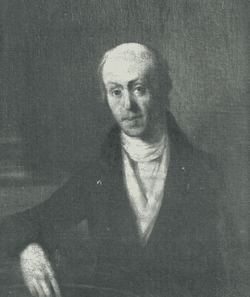Francis Robert West, Draughtsman
(b. ? 1749, d. 1809)
Draughtsman
From A Dictionary of Irish Artists 1913

Francis R. West. Picture, by R. L. West; in the Royal Hibernian Academy.
Was eldest son of Robert West (q.v.), and was born probably in 1749. He was trained as an artist under his father, and attained a proficiency in drawing "owing more to the indefatigable exertions of his father, who ground him in the rudiments of his art by dint of severity, than to any felicity of genius with which he was favoured by nature" ("Monthly Pantheon," April, 1809). Like his father he excelled as a draughtsman, though his style was mechanical; and he had a profound knowledge of the structure of the human figure which he drew with great precision, even without models. He confined himself almost entirely to crayon drawing, seldom touching a brush. After the death of his father he was, on the 26th January, 1771, appointed as his successor in the mastership in the Dublin Society's School, and in this post he continued until his death, teaching with great success and upholding the reputation the school had acquired under his father.
J. D. Herbert (q.v.), who was a pupil in the school, gives in his "Irish Varieties" a description of West: "A worthy good-hearted man, but of peculiar manner." In person, he tells us, "he was a smart, little, dapper man, very voluble in speech and rapid in delivery; used much action, even his features underwent many changes, opening his eyes wide, raising his eyebrows considerably and extending his mouth; his language good, yet he was subject to digression and habitual conclusive words, such as 'yes, yes,' 'doubtless, no doubt,' and other pet phrases which seemed to carry decision in all his harangues. Add to these a peculiar quaintness of manner, an averted eye, and a simplicity of look rendered him quite a character."
West was an exhibitor for many years at the Society of Artists in William Street, from 1770 to 1780; and at the exhibitions in 1800 and 1801. In 1770 and 1771 he was living "at Mrs. Duff's, Cope Street," but the following year he moved to Chequer Lane (Exchequer Street), where he resided during the rest of his life. His work consisted of portraits and figure subjects in crayons, with occasional historical pieces. The Dublin Society awarded him a premium of ten pounds for a chalk drawing exhibited in 1772. A portrait of "Arthur Smyth, Archbishop of Dublin," painted in 1771, Fras. West pinxt., was engraved in mezzotint by James Watson. A set of ten plates of "Moral Emblems" was engraved from his drawings, and in the "Hibernian Magazine" for 1789 is a plate after a drawing by him, engraved by W. P. Carey, "Science issuing from the College and presenting Genius to the Royal Irish Academy."
In the school he was assisted by his brother John, who looked after the boys and supplied them with their drawing materials, but was not an artist, his father having tried in vain every method, rewards and punishments, to make him draw. He lived with his brother whom he survived, dying on the 12th March, 1818.
Francis Robert West was an accomplished classical scholar, was well-read in literature, and had a great knowledge of artists of the various schools, especially of engravers, and was a diligent student of their works. He was a mild and amiable man, simple, with little knowledge of the world; full of kindness to others, and esteemed by all who knew him. He died in his house, No. 31 Exchequer Street, on the 24th January, 1809.
West married, as his first wife, a Miss Wolverston. The circumstances of the marriage, in which West was a most unwilling bridegroom, are related by J. D. Herbert in his "Irish Varieties." By his second wife, Ellen Walsh, he was the father of Robert Lucius West (q.v.), who succeeded him in the Dublin Society's School; of Michael West (q.v.), and of William West, a surgeon in the Navy.
A portrait of him, by his son, is in the Council Room of the Royal Hibernian Academy.
